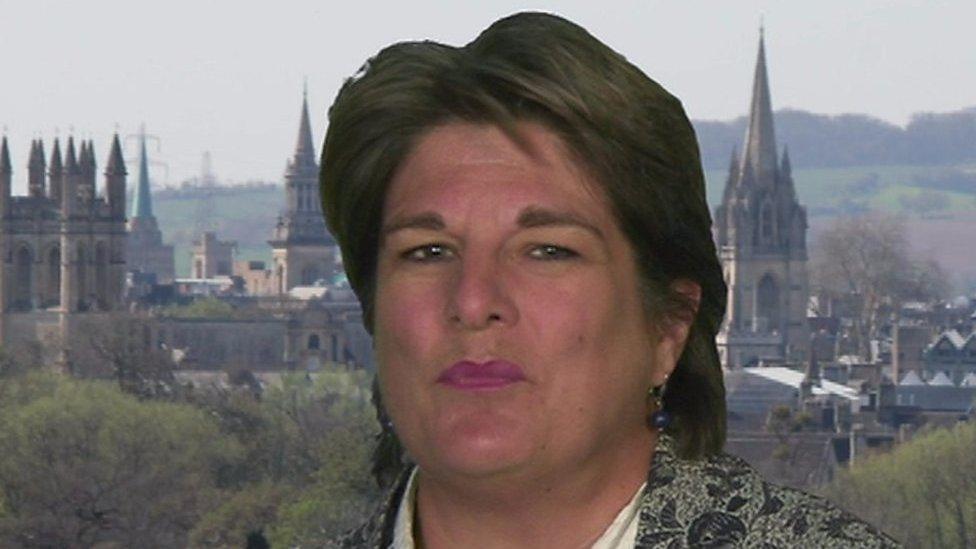Thousands of Canadians have signed petitions to ban conversion therapy
- Published
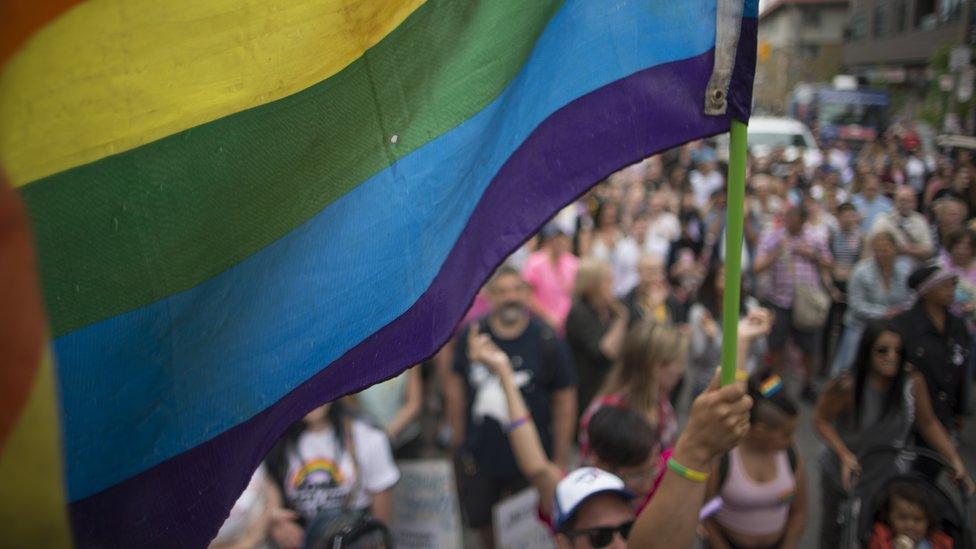
A man holds a pride flag at a rally in Toronto
Thousands of Canadians have rallied behind two petitions calling for a nationwide ban of conversion therapy. It's part of a wider global trend condemning the practice.
Peter Gajdics came out as gay to his family when he was 23. His staunchly Catholic parents rejected his homosexuality, and he left home.
But Gajdics found himself struggling with deep depression and with feeling alienated and estranged, and his doctor referred him to a psychiatrist.
That psychiatrist centred on Gajdics' sexuality as the problem, telling him that abuse he suffered as a child created a "false notion" that he was homosexual.
"So the goal in my therapy would be to work through my 'trauma' and therefore I would revert to my innate heterosexuality," says Gajdics. "Everything about my therapy became focused to do that."
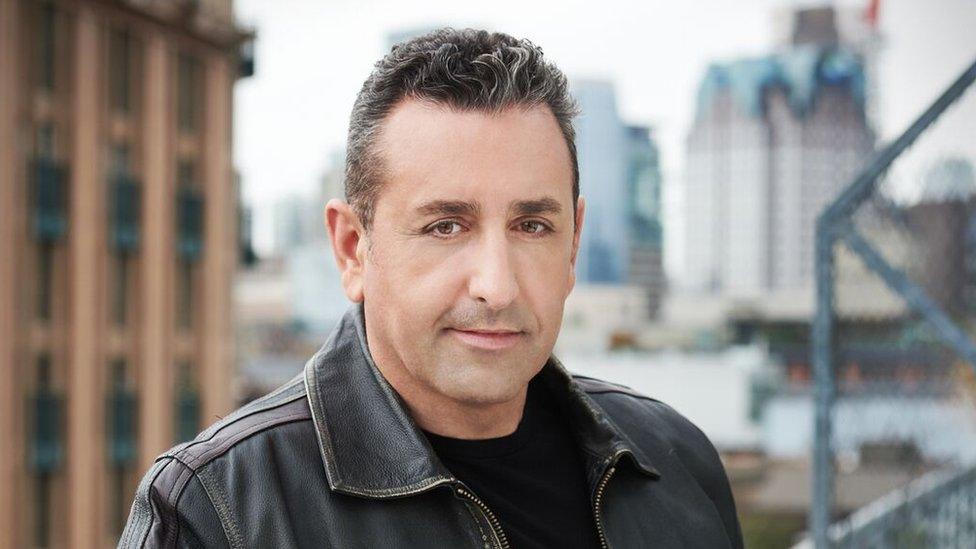
Author Peter Gajdics has campaigned against conversion therapy for some 20 years
The treatments grew increasingly intense. He was prescribed a cocktail of psychiatric medications - antidepressants, a sedative and more - and told they were necessary "to silence the noise" of his homosexuality.
The young Canadian man spent six years under the psychiatrist's care, eventually moving into a house with other patients, "isolated from the world, definitely not talking to family or former friends, which was prohibited".
He finally left the treatment, got off the medications, and sued the doctor for medical malpractice.
One of the grounds for his lawsuit, which was settled out of court in 2003, was that the psychiatrist had tried to treat Gajdics' homosexuality as a disease.
For Gajdics, part of the process of reclaiming his life after that experience was to speak out against conversion therapy - sometimes also called "sexual reorientation", "reparative", or "gay cure" therapy.
He recognises what he went through was an extreme form of the practice, but the intended goal of any form of conversion therapy is the same: to attempt to change an LGBT person's sexual orientation or gender identity.
Conversion therapy has been widely discredited by major psychotherapy and medical associations in many countries, including Canada, the US and the UK, and is opposed by the World Health Organisation and the United Nations.
Gajdics eventually wrote a memoir - The Inheritance of Shame - about his experience, and shortly before its release approached the city of Vancouver, where he lives, to lobby for a ban on the practice there.
A motion to prohibit businesses from providing conversion therapy to minors passed in June.
Three provinces in Canada - Ontario, Manitoba and Nova Scotia - have also taken steps to limit conversion therapy within their jurisdictions.
Now, there's a growing push for a nationwide ban.
Two separate petitions have racked up tens of thousands signatures since being posted earlier this year.
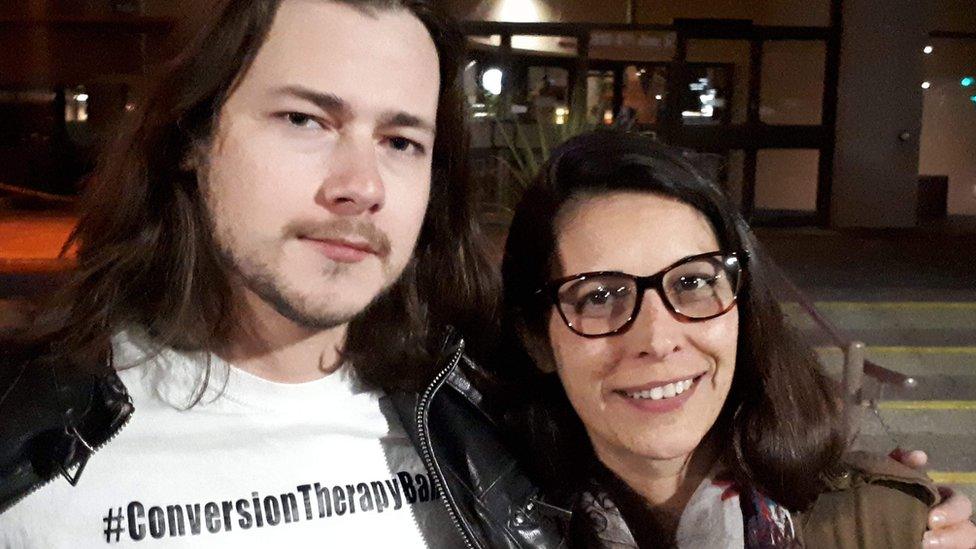
Devon Hargreaves and Jen Takahashi launched a petition to ban conversion therapy in Canada
"In 2018, there's no reason that Canada, which considers itself a forerunner in human rights, to be allowing the practice," Devon Hargreaves, who helped launch one of those campaigns, tells the BBC.
The petition, which has more than 11,200 signatures so far, calls on Canadian legislators to ban conversion therapy for minors and to prohibit taking minors outside of the country for such purposes.
The second petition, started by It Gets Better Canada, an affiliate of the US-based non-profit organisation that supports LGBT youth, has over 58,400 signatures.
That petition calls on the federal government to clearly state that Canada "opposes the use of conversion therapy and other related treatments" and to develop policies to prevent anyone from attempting to alter a minor's sexual orientation or gender identity or expression.
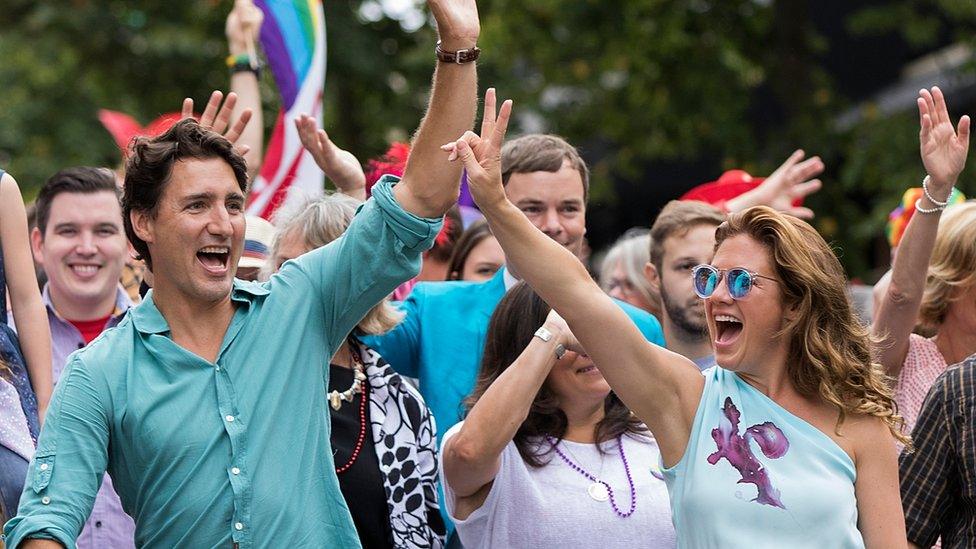
Prime Minister Justin Trudeau and his wife Sophie Gregoire Trudeau (R) at a Vancouver Pride parade
It Gets Better Canada's Chris Gudgeon says people have two reactions when they hear about the group's efforts to ban the practice: "'I can't believe this is happening in Canada', or 'this happened to me and it's time we ban it''.
A number of factors have brought the issue into the open in recent years.
"There was this strange moment where all of a sudden conversion therapy caught people's attention," says Gudgeon.
Three years ago, former US President Barack Obama spoke out against the practice after the suicide of a transgender teenager who posted online about religious therapists trying to turn her back into a boy.
This year saw Hollywood release two films that centre on conversion therapy.
Boy Erased is based on American writer Garrard Conley's personal experience with conversion therapy in Bible belt southern US.
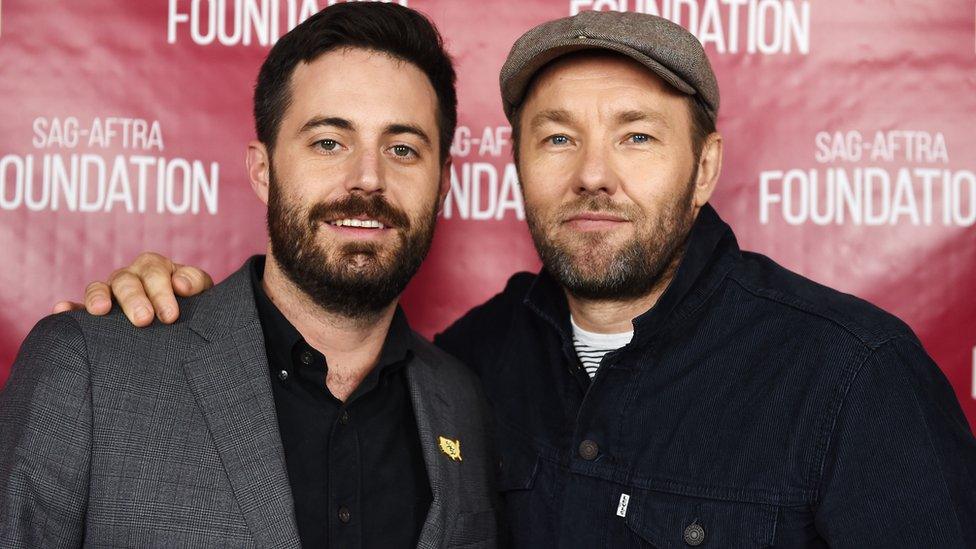
Boy Erased author Garrard Conley (L) and director and actor Joel Edgerton attend a screening of the film
The Miseducation of Cameron Post, which took home one of the top prizes at the latest Sundance film festival, tells the fictional tale of a gay teenage girl sent to a conversion camp in the 1990s.
Lucas Ramon Mendos, who researches conversion therapy legislation worldwide for The International Lesbian, Gay, Bisexual, Trans and Intersex Association, says he has seen a shift in the debate over the past year.
"There's a lot happening, it's taking various forms, not just bills," he tells the BBC.
He points to efforts in Australia and Spain, and to China, where last year a court ruled against a hospital that had forced a gay man into conversion therapy, ordering a public apology and compensation.
In the US, a record number of states have tabled proposed legislation to tackle the issue amid a national "50 Bills, 50 States" campaign to ensure protections across the country.
Nineteen states have proposed legislation to protect LGBT youth, external from conversion therapy and 14 states, as well as DC, prohibit the practice, external.
In July, the UK announced plans to bring forward proposals to end conversion therapy, which it called a "harmful practice".
Mendos says that "for the first time victims have had the courage and the tools and the space to come out and speak about this".
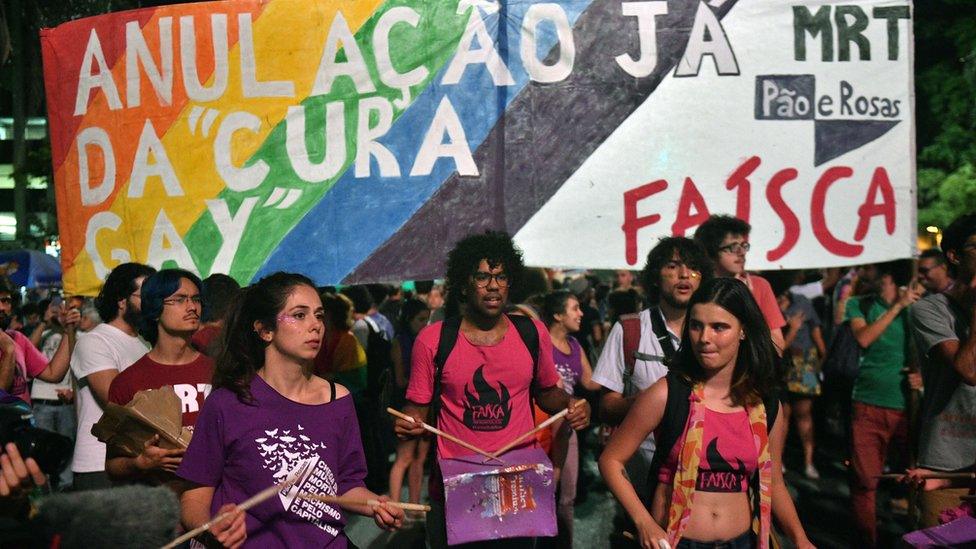
People protest against a Brazilian judge's decision to approve conversion therapy, throwing Brazil's ban into doubt
"This is one of the issues in which victims were forced into a scheme of shame, were harmed through these techniques, of questioning the self-identity of a person."
There are no current statistics on the practice in Canada, but a 2017 UK government survey of LGBT citizens indicated that 2% of respondents had undergone conversion therapy and a further 5% had been offered it.
Faith organisations were by far the most likely to have carried out the practice, according to the report.
In the US, an estimated 700,000 LGBT adults have received conversion therapy, about half when they were in their teens, according to research out of the University of California at Los Angeles.
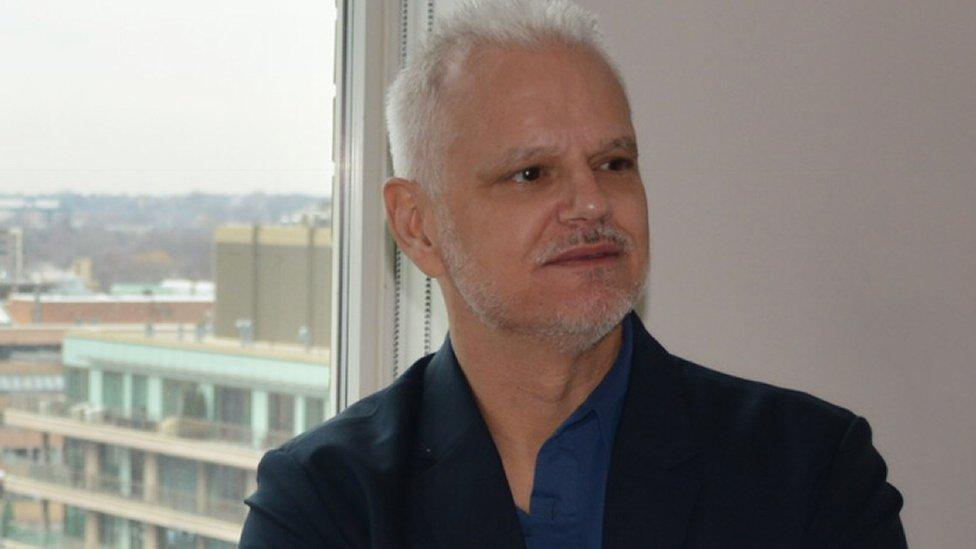
Chris Gudgeon
Researchers also estimated that some 20,000 LGBT teens between 13 and 17 will receive some form of the therapy from a medical professional and another 57,000 from a religious adviser.
Those who monitor conversion therapy say they've noticed a shift in recent years away from organisations promising a "cure" to offering instead the ability to suppress any expression of an LGBT individual's sexuality.
Gudgeon says he thinks that those who offer some form of conversion therapy often believe they are trying to help youth struggling with their identity.
Many LGBT youth coming to terms with their sexuality "want to stop feeling conflicted", he says.
Having support can be vital, he says, but "the fact is, that going to a therapy that tries to talk you into being somebody you're not isn't going to help you. It doesn't solve the conflict".
Chloe Grace Moretz: "My brothers tried to pray the gay away"
Both Hargreaves and Gudgeon are hopeful for a positive response on their respective campaigns from Justin Trudeau's Liberal government, which has made efforts to support LGBT Canadians in the past.
Hargreaves' petition, filed on the parliamentary e-petition site, is guaranteed a formal response since it surpassed the 500 signature benchmark for a government response the night it was posted.
Gajdics, who has been campaigning against the practice for some 20 years, says he is " thrilled" at the growing international scrutiny.
"It's been a long, long time coming," he says.
"It's such a deep, deep transgression and violation of the gay person, of the lesbian person, of the trans person, it cuts to such a deep level psychically, emotionally."
- Published15 June 2018
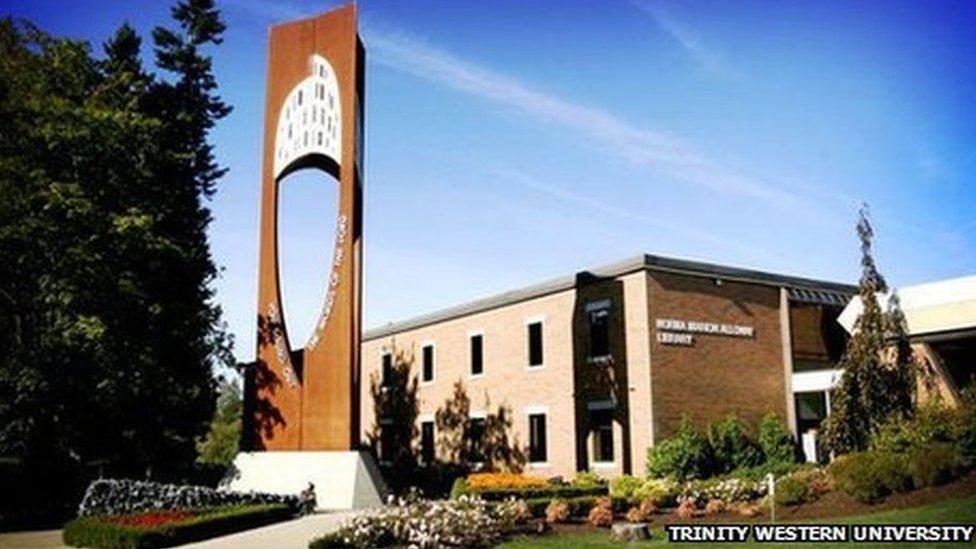
- Published28 November 2017
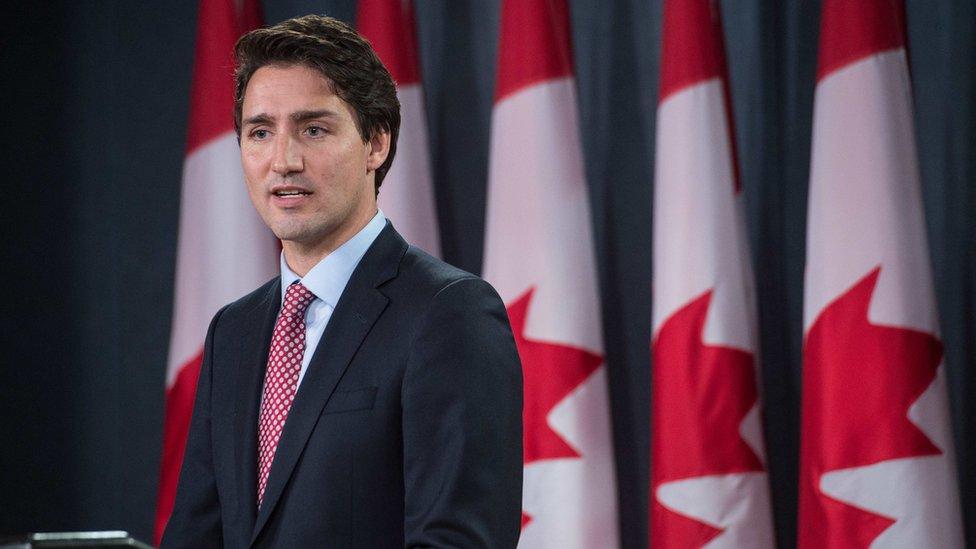
- Published22 August 2018

- Published3 July 2018
